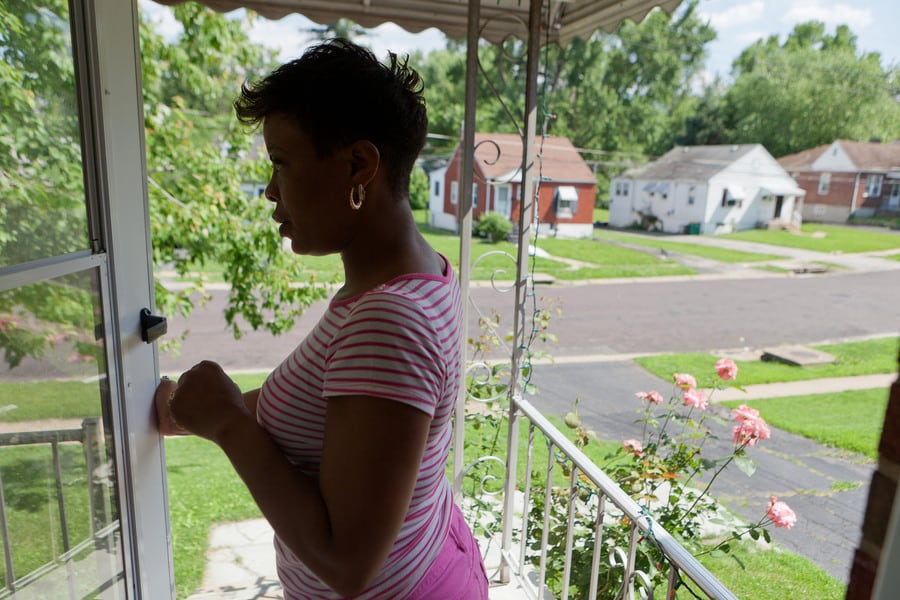Near the end of one street in Jennings sits a neat brick bungalow, similar to others lining the block. Its windows look out on a shady tree and a patch of grass just large enough to be called a lawn.
Until 2012, Cori Winfield lived here with her four kids. In 2013, Rosalyn Turner moved in with two of her children. The two women do not know each another, but they are connected by more than just the house: They have both been sued by a local subprime auto lender Midwest Acceptance.
And they have both learned a harsh lesson: Through court judgments, companies like Midwest can pursue debts for decades, following debtors to each promising new job, each new savings account.
Back in 2009, Winfield, 38, visited Allstar Motors, a used car lot, after her car disappeared from her street one morning. Believing it stolen, she’d filed a police report. It wasn’t until years later, she said, that she found out the car had actually been towed because of unpaid parking tickets.
When she was a teenager, she’d saved up from her job at White Castle to buy her first car, a feat, she said, that taught her “if I can do that, I can do everything else I put my mind to.”
But this time, she’d had no chance to save. Getting to work, taking her kids where they needed to go — that required a car, and she’d only put away a couple hundred dollars.
At Allstar, she found a 2002 Dodge Caravan for $8,000, more than she was used to paying for a car. Her credit was spotty, so the loan the dealer offered her was steep, too: it came at a 30 percent annual interest rate. But Winfield thought she couldstretch to make the $327 monthly payment.
It was a hopeful time in Winfield’s life. The year before, she’d started a new job at a brokerage services firm and had already seen a bump in pay from $12 to $13 an hour. In the fall of 2009, she and her husband, who worked as a janitor, bought the brick bungalow, their first home. She’d managed to pay off her student loans in order to qualify for the mortgage, she said. It was a landmark accomplishment.
But one year later, the minivan payments proved to be too much after all, and the lender, Midwest Acceptance, repossessed the vehicle. She and her husband separated, and she couldn’t afford the mortgage on her own. The couple declared Chapter 13 bankruptcy, a move that at least put off foreclosure. But they defaulted on the bankruptcy plan payments after about five months.
In that, they were typical of black debtors. Most Chapter 13 filers default and thus retain their debts. But there’s evidence that black debtors are often steered to Chapter 13 plans even though filing through Chapter 7, which is less costly and can provide near-immediate relief, would be the better choice. A 2012 study found blacks were twice as likely to file under Chapter 13 as other filers.
Robert Lawless, a law professor at the University of Illinois who was one of the authors of the 2012 study, said the racial skew in bankruptcy filings should be seen in conjunction with the disparity in debt collection lawsuits. ProPublica’s analysis, “along with our study and many others, shows that the civil justice system is not working well for lower-income blacks,” he said.
The day Winfield’s bankruptcy was dismissed, Midwest Acceptance filed suit against her. She owed almost $5,000, the company claimed, for a car she no longer had. Midwest had auctioned off the Dodge Caravan for $3,050 — less than half what she’d paid for it just 18 months earlier — but added $1,100 in fees from the repossession to her debt. And the balance was still running at the high interest rate.
Now without a car, the whole family took the bus, which meant at least three hours a day in transit for Winfield.
Her priorities became basic: keeping the gas on, finding a place to live, saving for another car. Amid these demands, the debt to Midwest fell by the wayside. But by securing a judgment against Winfield, Midwest ensured that the company would get its money whether it fit in her budget or not.








